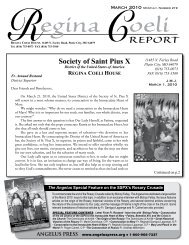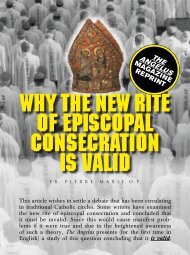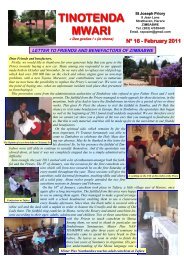Is Feeneyism Catholic? - Society of St. Pius X
Is Feeneyism Catholic? - Society of St. Pius X
Is Feeneyism Catholic? - Society of St. Pius X
Create successful ePaper yourself
Turn your PDF publications into a flip-book with our unique Google optimized e-Paper software.
98 IS F EENEYISM C ATHOLIC?<br />
4. Bro. Robert Mary accuses: “Fr. Laisney completely disregards<br />
the traditional teaching <strong>of</strong> the Church on the necessity <strong>of</strong> the<br />
baptismal seal impressed only by the sacrament.” 139 I challenge<br />
him to show it! The Church in her documents is very careful to<br />
place the absolute necessity precisely not on the sacrament <strong>of</strong> faith,<br />
but on the faith <strong>of</strong> the sacrament as we have seen above (see Innocent<br />
III, p.43, and the Council <strong>of</strong> Trent in footnote 70). This is<br />
because that which is absolutely necessary is sanctifying grace<br />
(faith living through charity), and not the exterior sacrament.<br />
This one (and its character) is necessary relatively to this sanctifying<br />
grace and not by itself. Thus it is necessary re aut voto. Truly,<br />
the followers <strong>of</strong> Fr. Feeney say <strong>of</strong> the baptismal character that<br />
which the Church teaches <strong>of</strong> baptismal grace, i.e., sanctifying<br />
grace.<br />
5. “The ‘desire for baptism,’ if properly made, may put a person<br />
in the state <strong>of</strong> sanctifying grace. If the person perseveres in<br />
and dies in that state, he still cannot enter the kingdom <strong>of</strong> God.<br />
He lacks the one thing that only the sacrament can provide–the<br />
indelible mark or spiritual character imprinted on his soul.” 140<br />
That goes explicitly against the Council <strong>of</strong> Trent saying that “the<br />
justified have everything necessary for them,” as we shall see now.<br />
JUSTIFICATION AND SALVATION<br />
Since the Council <strong>of</strong> Trent teaches that baptism was “necessary<br />
for justification…re aut voto–in fact or in desire,” it is clear<br />
that the character <strong>of</strong> baptism is not absolutely necessary for justification.<br />
Thus Fr. Feeney taught that the character <strong>of</strong> baptism was<br />
absolutely necessary, not for justification, but for salvation.<br />
The distinction between justification and salvation is classic<br />
in the Church’s teaching: Justification is the passage from the state<br />
<strong>of</strong> sin to the state <strong>of</strong> grace; salvation is the passage from the state <strong>of</strong><br />
grace in this world to the state <strong>of</strong> glory in heaven (either directly<br />
or through purgatory). Thus justification is the beginning <strong>of</strong> the<br />
spiritual life, salvation is its end.<br />
139 Op. cit., p.202.<br />
140 Bro. Robert Mary, op. cit., pp.116, 117.











